Archives
ULFA Leaders – Bailing out of a sinking ship
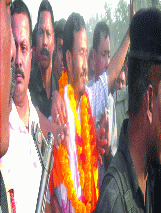 government had no objection if they were given bail, both were granted the same on February 23. The court, granting bail, directed the two ULFA leaders not to leave Guwahati without prior information and asked them to report to local police stations if they leave for their home towns.
government had no objection if they were given bail, both were granted the same on February 23. The court, granting bail, directed the two ULFA leaders not to leave Guwahati without prior information and asked them to report to local police stations if they leave for their home towns.
Though they were granted bail together, Pradip Gogoi could not complete a few follow-up procedures and this delayed his release. Mithinga Daimary came out from the Guwahati jail on February 25. Daimary, 43, served jail terms since he was arrested (and subsequently handed over to Indian authorities) during the Bhutan operation in December 2003.
Talking to media persons in Guwahati soon after his release, Daimary, whose real name is Dipak Das expressed his gratitude to the government for his release. Commenting that it was a “positive response from the government,” Daimary however maintained that other senior ULFA leaders should also be released for the proposed talks.
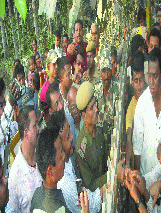 Daimary, also a poet with the nick name of Megan Kachari, went to his residence in Barama of Nalbari district. The ULFA leader was emotional while saying that he was “returning with an empty hand to an empty home.” It may be mentioned here that Daimary’s mother, elder brother, pregnant sister-in-law and younger sister were killed by unidentified gunmen a decade back.
Daimary, also a poet with the nick name of Megan Kachari, went to his residence in Barama of Nalbari district. The ULFA leader was emotional while saying that he was “returning with an empty hand to an empty home.” It may be mentioned here that Daimary’s mother, elder brother, pregnant sister-in-law and younger sister were killed by unidentified gunmen a decade back.
Pradip Gogoi was finally released from the same jail on March 4. One of the founder-members of ULFA, Gogoi was arrested in 1992 from Kolkata and he had since been behind bars. Talking to media persons at his home in Baksu Mauthgaon of Sibsagar district, Gogoi demanded the release of all jailed leaders in pursuance of the peace process.
He even claimed that ULFA’s Commander-in-Chief Paresh Barua would “come for talks if the government creates the right atmosphere for the exercise.” Elaborating on ‘the right atmosphere’, Gogoi argued that the government should initiate the release of all jailed ULFA leaders and also lobby for bringing back ULFA’s General Secretary Anup Chetia, who is till date serving a jail term in the Bangladeshi capital city Dhaka as he has been doing for many years.
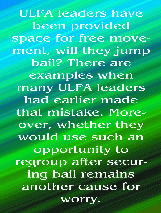 Amazingly, the Guwahati Jail is now home to almost all the top leaders except self-syled Commander-in-Chief
Amazingly, the Guwahati Jail is now home to almost all the top leaders except self-syled Commander-in-Chief 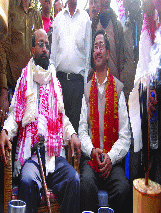 Paresh Barua and General Secretary Anup Chetia. Those in Guwahati jail include ULFA Political Adviser Bhimakanta Buragohain (recently shifted from Tezpur to Guwahati), Chairman Arabinda Rajkhowa, Foreign Secretary Shasha Choudhury, Finance Secretary Chitraban Hazarika, Cultural Secretary Pranati Deka and Deputy Commander-in-Chief Raju Barua.
Paresh Barua and General Secretary Anup Chetia. Those in Guwahati jail include ULFA Political Adviser Bhimakanta Buragohain (recently shifted from Tezpur to Guwahati), Chairman Arabinda Rajkhowa, Foreign Secretary Shasha Choudhury, Finance Secretary Chitraban Hazarika, Cultural Secretary Pranati Deka and Deputy Commander-in-Chief Raju Barua.
New Delhi still believes that ULFA’s military chief Paresh Barua is hiding somewhere along the Burma-China border. The notorious militant leader, as the Indian security agency claims, had recently left Bangladesh to hide in Burma. Barua might have come to know about the change of heart in Dhaka towards New Delhi which finally resulted in the deportation of some top ULFA leaders to India (from Bangladesh) recently.
The local media remains speculative but positive about the talks. Similarly, various socio-political and advocacy groups of the state came out with their official statements that they want peace as early as possible. They are unanimous that the common people can not afford to live with insurgency turned terrorism for decades. Rather they want development and prosperity in a peaceful ambience.
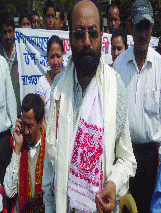 During his recent visit to the North East, the Indian Union Home Secretary GK Pillai expressed hope that ULFA leaders would attend the talks. He even clarified that New Delhi would not insist on a formal letter from the outfit expressing its eagerness for a discussion.
During his recent visit to the North East, the Indian Union Home Secretary GK Pillai expressed hope that ULFA leaders would attend the talks. He even clarified that New Delhi would not insist on a formal letter from the outfit expressing its eagerness for a discussion.
It is mentionable here that the issue of a formal letter from the ULFA leaders remained a major hurdle for the talks between the government and the underground outfit. The Indian Union Home Minister P Chidambaram had earlier asked for such a letter and the Assam Chief Minister supported him.
Even ULFA chief Rajkhowa acknowledged his interest for a dialogue with the government. Talking to media persons while on his way to court recently, he reiterated that ULFA was keen in solving the long standing conflict situation in Assam. If needed, the ULFA leaders would agree to some compromise on the demand for sovereignty too, Rajkhowa revealed. He assured that the outfit would keep the people of Assam in confidence and let them know about any developments in the process.
However the question that arises is, now that the other ULFA leaders have been provided space for free 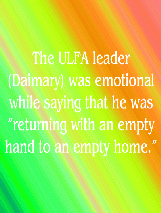 movement, will they jump bail? There are examples of when many ULFA leaders had earlier made that mistake. Moreover, whether they would use such an opportunity to regroup after securing bail remains another cause for worry.
movement, will they jump bail? There are examples of when many ULFA leaders had earlier made that mistake. Moreover, whether they would use such an opportunity to regroup after securing bail remains another cause for worry.
But the political observers in Guwahati believe that the ULFA has little scope for regrouping at this moment. The ULFA leaders have already lost their support base to a great extent and thus it would be suicidal for them to decide to betray the court and the people of Assam. It is therefore very probable that talks will lead to some major changes in the security arena of Assam. It is likely that Assam might actually be very close to the end of a problem which has hounded it for over three decades.
Nava Thakuria
